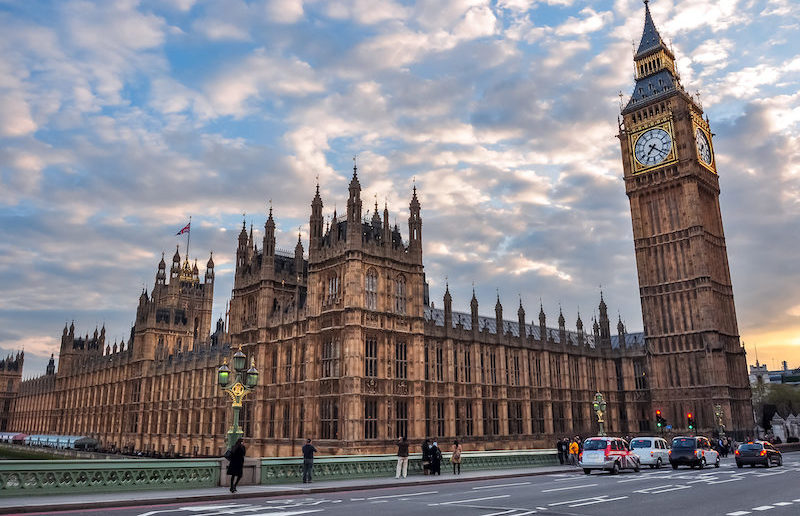
The United Kingdom’s lockdown measures prompt questions of its legality.
The United Kingdom (U.K.) responded differently than other countries at the start of the coronavirus crisis. The government’s initial policy, in hindsight, appears ill thought-through and has already faced growing criticism. The U.K. subsequently took a more orthodox approach—adopting social distancing measures, restricting movement, and ultimately implementing a nationwide lockdown.
As with many other countries, the U.K. government adopted emergency legislation as part of its strategy to deal with the COVID-19 outbreak. Parliament fast-tracked legislation in break-neck speed—receiving Royal Assent for the Coronavirus Act 2020 on March 25. The government also adopted additional regulations to implement the lockdown. In total, these amount to some of the most restrictive measures the U.K. has ever implemented during peacetime.
The Coronavirus Act 2020 introduces temporary measures designed to mitigate the effects of the pandemic on the workforce and health services. This law provides for new registration powers to increase the number of health care and social care workers and to allow for emergency volunteers. It also grants certain officials—such as police, immigration officers, and public health officials—powers to detain and screen persons with or suspected to have COVID-19.
From a financial perspective, the Coronavirus Act implements a series of targeted measures to support individuals, including modifications to the sick pay scheme and pension rules. The law also supports institutions by providing financial assistance to industry and enabling Her Majesty’s Revenue and Customs—a non-ministerial department of the government—to create the furlough system. Other measures include protecting residential and certain commercial tenants from eviction, using video technology in court proceedings, and expanding covert surveillance powers.
Given the sweeping powers in the Coronavirus Act 2020 and the fast-tracked parliamentary process, the opposition in Parliament pushed to include sunset clauses. The law is subject to a sunset clause by which the majority of the provisions lapse after two years—a somewhat long period of time. The law is, however, subject to a review by Parliament after six months. Similar legislation in other countries such as Ireland and France seems to be subject to more robust provisions. In Scotland, Part One of the Coronavirus Act expires automatically after six months, and the Scottish Parliament can only extend the provisions for a maximum of 12 months.
In addition to the Coronavirus Act 2020, the U.K. government also enacted health protection regulations to impose a nationwide lockdown. These regulations, premised upon the Public Health (Control of Disease) Act 1984, impose severe restrictions on liberty and freedom of movement of persons in the United Kingdom. The regulations require certain businesses to close and restrict movement and gatherings. The centerpiece of the regulations—found in Regulation 6—is a requirement that provides that during the emergency period no persons shall leave their homes until further notice other than for limited purposes (“without reasonable excuse”). Those who breach that obligation are subject to a criminal offense, punishable with a fine. The regulation prohibits gatherings of more than two people except in restricted circumstances. Certain types of businesses are also closed. Police officers—and others designated by local authorities or Ministers—can enforce these restrictions. The enforcement powers are very broad. They allow police officers to direct someone who is not at home to return home or to remove them physically to the place where they are living—subject to proportionality requirements.
It is understandable that the government would implement extensive measures to ensure an effective response to the COVID-19 crisis. Nevertheless, the scope and extent of the powers contained in the health protection regulations are extremely expansive. Critics have raised concerns from human rights and rule of law perspectives. The U.K. government has already amended the regulations.
One particular concern has been about the asymmetrical nature of these rules across the nations of the U.K., due in part to the fact that health is a devolved matter within the U.K.’s constitutional set up. This has been a recurrent pattern during the COVID-19 crisis, illustrated by different nations within the U.K. adopting different guidelines to regulate issues such as school closures and exit strategies. Such a disjointed approach is not ideal when a clear message from government is important for influencing public behavior. This asymmetry is reflected in the lockdown where the rules set out in the health protection regulations that apply to England differ from those that apply to other nations of the United Kingdom.
More fundamentally, there has been a good deal of discussion about the lawfulness of the regulations, in particular the restrictions on movement. Barrister and peer Lord David Anderson of Ipswich first raised the issue of whether the relevant restrictions on movement were actually within the powers conferred upon the government by the relevant statute. After a careful review of the provisions, he concluded that the “impact on personal liberty in Regulation 6 goes right up to the limit of what is permitted under its parent statute, and arguably beyond.”
Tom Hickman, a barrister and academic at University of College London, and other scholars have raised similar concerns that portions of the regulations may exceed statutory authority. They point out, however, that in times of crisis, courts may adapt rules of statutory interpretation “in a way that confers the widest powers on Government that the words will reasonably bare.” Nevertheless, these commentators’ ultimate conclusion is critical, and they consider it preferable for the measures to be “placed on a firmer legislative footing.”
Other scholars have made contrary arguments. In particular, Professor Jeff King of the University of College London has argued powerfully in a recent piece that the lockdown provisions are in fact lawful and can be supported by a literal reading of the Public Health Act’s enabling powers as conferring powers to impose the lockdown.
The U.K. government may have been slow to react in the early days of the COVID-19 crisis, but since then it has moved swiftly to implement expansive lockdown restrictions. These restrictions push the limits of the government’s statutory authority, and it would have been preferable for the government to have based its lockdown provisions on clear and unambiguous statutory authority based upon primary legislation such as the Coronavirus Act 2020. Nevertheless, it is unlikely that a court would find the regulations to be unlawful. This does not mean, however, that additional safeguards would not be welcome.
This essay is part of an ongoing series, entitled Comparing Nations’ Responses to COVID-19.




